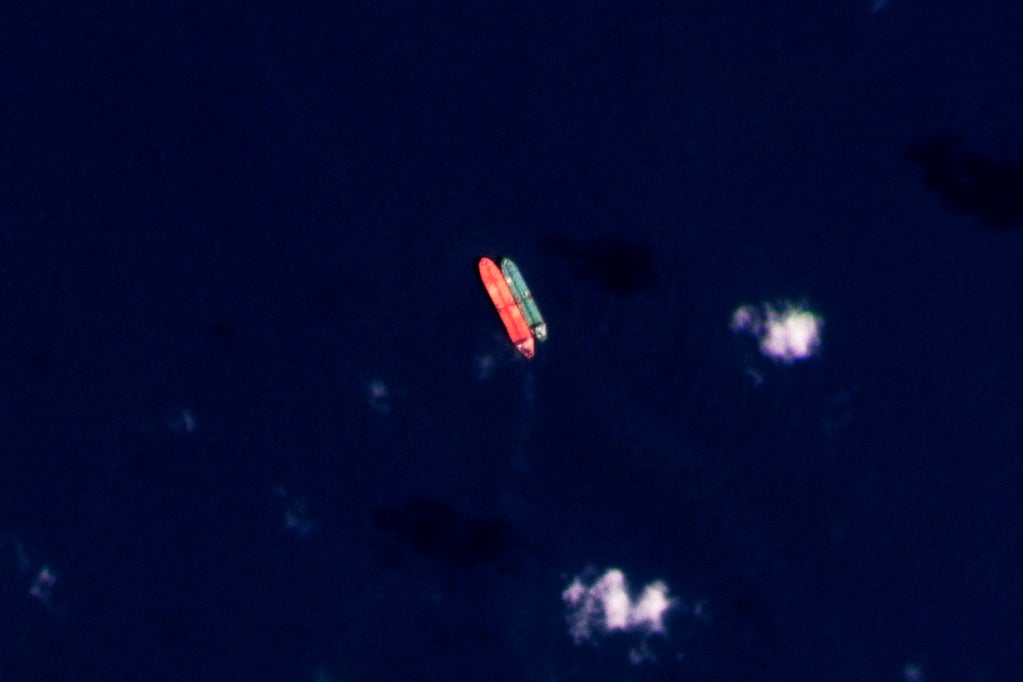Iran summons Swiss diplomat over US seizure of Iranian crude oil that's now at port in Houston
Iran has summoned a Swiss diplomat over the apparent U.S. seizure of Iranian crude oil from a ship that sat for months off Texas

Your support helps us to tell the story
From reproductive rights to climate change to Big Tech, The Independent is on the ground when the story is developing. Whether it's investigating the financials of Elon Musk's pro-Trump PAC or producing our latest documentary, 'The A Word', which shines a light on the American women fighting for reproductive rights, we know how important it is to parse out the facts from the messaging.
At such a critical moment in US history, we need reporters on the ground. Your donation allows us to keep sending journalists to speak to both sides of the story.
The Independent is trusted by Americans across the entire political spectrum. And unlike many other quality news outlets, we choose not to lock Americans out of our reporting and analysis with paywalls. We believe quality journalism should be available to everyone, paid for by those who can afford it.
Your support makes all the difference.Iran has summoned a Swiss diplomat over the apparent U.S. seizure of Iranian crude oil from a ship that sat for months off Texas, an official said Monday, as the oil now appeared to be moored in Houston.
The remarks by Iranian Foreign Ministry spokesman Nasser Kanaani mark the latest twist in the saga of the oil once aboard the tanker Suez Rajan, which had become mired in the wider tensions between the U.S. and the Islamic Republic. That's even as Tehran and Washington work toward a trade of billions of dollars in frozen Iranian assets in South Korea for the release of five Iranian-Americans held in Tehran.
Iran has been trying to evade sanctions and continue selling its oil abroad, while the U.S. and its allies have been seizing cargoes since 2019 after the country’s nuclear deal allowing the trade collapsed.
Speaking to journalists Monday, Kanaani said Tehran had summoned the chargé d’affaires of the Swiss Embassy in Iran to express a “strong objection” over the U.S seizing the oil. Switzerland has looked out for America's interests in Iran since the 1979 U.S. Embassy hostage crisis.
Kanaani's comments also acknowledged the oil was Iranian.
“The subject of the seizure of an Iranian oil consignment by the U.S. ... is a completely unproductive action," Kanaani said. He said the U.S. government was on the one hand expressing interest in direct talks to pave the way for a renewed nuclear deal and on the other was imposing new sanctions and seizing oil.
The U.S. State Department did not immediately respond to a request for comment.
The saga over the Suez Rajan began in February 2022, when the group United Against Nuclear Iran said it suspected the tanker carried oil from Iran’s Khargh Island, its main oil distribution terminal in the Persian Gulf.
For months, the ship sat in the South China Sea off the northeast coast of Singapore before suddenly sailing for the Gulf of Mexico without explanation. Analysts believe the vessel’s cargo likely has been seized by American officials, though there still were no public court documents Monday involving the oil.
On Aug. 20, the Suez Rajan began transferring its oil to the tanker MR Euphrates, ship-tracking data analyzed by The Associated Press showed. On Monday, data showed the MR Euphrates moored in Houston at a major oil terminal, likely preparing to discharge the crude it carried from the Suez Rajan.
The Los Angeles-based private equity firm Oaktree Capital Management had owned the Suez Rajan until late May, when it was taken over the Greek-based firm Empire Navigation. The MR Euphrates also is owned by Empire, which did not respond to a request for comment Monday.
Since the Suez Rajan headed for America, Iran has seized two tankers near the Strait of Hormuz, including one with cargo for U.S. oil major Chevron Corp. In July, the top commander of the Revolutionary Guard’s naval arm threatened further action against anyone offloading the Suez Rajan, with state media linking the recent seizures to the cargo’s fate.
Iran’s 2015 nuclear deal with world powers saw it regain the ability to sell oil openly on the international market. But in 2018, then-President Donald Trump unilaterally withdrew from the accord and re-imposed American sanctions. That slammed the door on much of Iran’s lucrative crude oil trade, a major engine for its economy and its government. It also began a cat-and-mouse hunt for Iranian oil cargo — as well as series of escalating attacks attributed to Iran since 2019.
The delay in offloading the Suez Rajan’s cargo had become a political issue as well for the Biden administration as the ship had sat for months in the Gulf of Mexico, possibly due to companies being worried about the threat from Iran.
The U.S. Navy has increased its presence steadily in recent weeks in the Mideast, sending the troop-and-aircraft-carrying USS Bataan through the Strait of Hormuz and considering putting armed personnel on commercial ships traveling through the strait to stop Iran from seizing additional ships.
___
Gambrell reported from Dubai, United Arab Emirates.